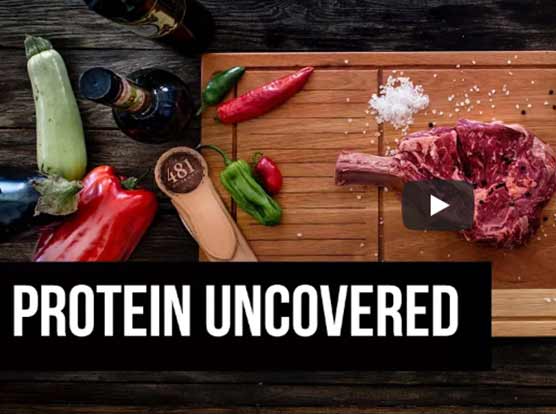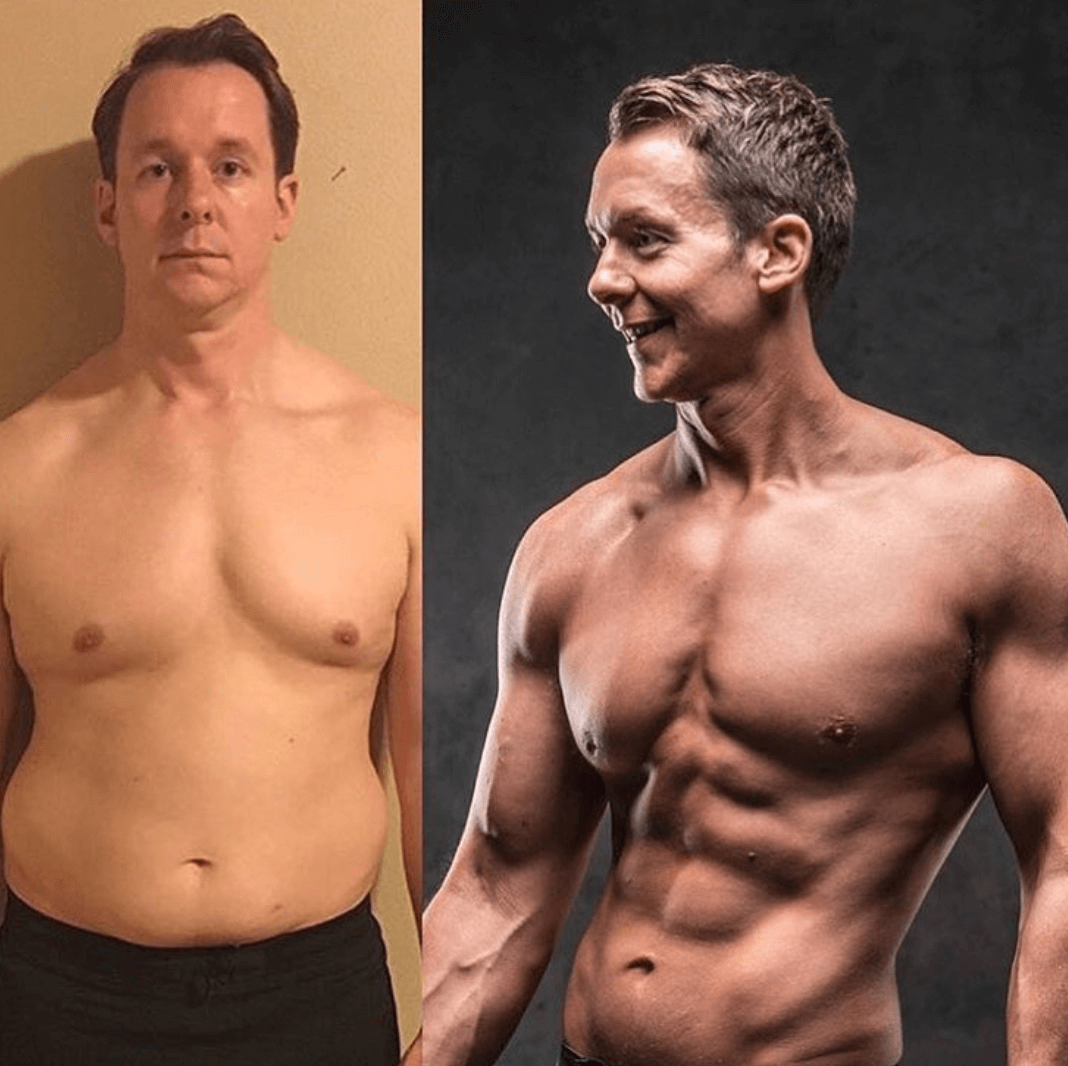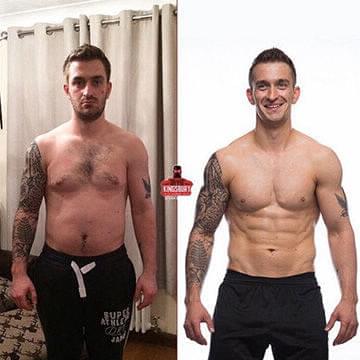Protein is one of the three main macronutrients, or macros, that make up you diet, the others being carbohydrates and fats.Â
They are made of amino acids, which are required almost everywhere in your body.Â
If you donÂ’t eat enough of these, your body will start to break down muscle in your body to create its own amino acid source[1].Â
If you eat no or almost no protein, this can lead to serious illness or death.
ThereÂ’s lots of different types of amino acids.Â
Meat and animal products contains a good balance of them all, so if you get your protein from meat, dairy or eggs, youÂ’re all set.
It used to be thought that vegetarians needed to mix their protein sources to obtain the right balance of amino acids, but we now know that if you are a vegetarian and you have a moderately balanced diet, youÂ’ll be fine[2][3[4].Â
The only exception to this rule is if your diet relies very heavily on fruit, tubers (potatoes), or junk food (flour, sugar and fat). If this describes your diet, I would strongly recommend changing your diet for something a bit more balanced.Â
So, how much protein should you eat?Â
Your body functions well with a range of protein.Â
Most people get about 15% of calories from protein[5], but consuming 40% or even 50% of calories from protein has no negative consequences, and in fact promotes muscle gain[6].
The International Society of Sport Nutrition has some very clear guidelines based on protein consumption, which I think are worth sharing[7]:
The more active you are, the more protein you need .
More protein leads to better results for athletes.
High protein intake has no proven negative health consequences.
There is no apparent difference between protein sources – it doesnÂ’t matter whether youÂ’re getting it from meat, dairy, eggs, vegetables, beans or pulses, all protein is pretty similar.Â
Current guidelines for recommended daily intake of protein are considered to be a minimum intake.Â
In the UK, they work out to about 10% of calories from protein. Exceeding these guidelines, even by a 4 or 5 times, is fine.
High protein diets have been proven to be more effective for weight loss.Â
A massive study published in the American Journal of Medical Nutrition, showed that High
Protein diets resulted in an extra kg of weight loss over 12 week diet compared to normal protein level diets[7]Â
What about the stories about protein being bad for my health?Â
Some studies have shown a relationship between high protein diets and heart disease[8].
However, there is no evidence that it is the protein which is causing the heart disease.Â
A diet heavy in fatty meats such as pork and red meat is high in fat, and a high fat diet can cause heart disease.Â
Try eating lean cuts of meat to reduce your fat intake.
Also, if you eat a lot of fatty or processed meat, you should consider swapping it for lean unprocessed meats instead.Â
A massive study of over 1 million people showed no relationship between eating red meat and heart disease or diabetes, but that eating processed meat increases the risk of heart disease by 42% and diabetes by 19%[9].
If you have kidney or liver damage, your doctor will tell you to cut down on protein.Â
ThatÂ’s because protein causes your kidneys and liver to work harder to process your food, and if you have damaged kidneys or liver already, this is a bad idea[10]. Â
But if your kidneys and liver work fine, thereÂ’s nothing to worry about: there is no clear evidence that eating lots of protein causes kidney or liver damage[11].Â
It is true that your body can lose some calcium due to high protein consumption, but there is no evidence that osteoporosis, or bone damage, can be caused by this, provided your diet includes a source of calcium.Â
There’s plenty of calcium in dairy products, seafood, fruit, legumes and leafy greens. If your diet contains none of these things, you should change your diet, as a lack of all those foods is likely to have other more serious health ramifications.
In fact, bones are made of protein.Â
Evidence has shown that a high protein diet can decrease the risk of getting osteoporosis, especially among those most at risk, the elderly[12].Â
Also, resistance training combined with protein consumption strengthens bones over time[13].
There is a link between high protein intake and cancer.Â
 However, there is no evidence that it was the large amount of protein in a diet that caused the cancer[14].
There has been a link shown between processed meat and bowel cancer. Examples include meats such as deli meats, sausages, bacon and salami.
I would recommend limiting your intake of these meats anyway, as they are often high in fat and additives, and sticking to unprocessed low fat white meats such as chicken, turkey and fish.
When should you eat protein, and how often?Â
There is a common belief that after a workout you have about 20-30 minutes to consume lots of protein to promote muscle growth. Â
We now know this isnÂ’t true.Â
A study of over 500 people published in the Journal of the International Society of Sports Nutrition showed that timing doesnÂ’t matter too much – all that matters is the total amount of protein consumed[13].
Another study compared eating protein before exercise, or after exercise, and also found no difference[14].
What are the best sources of protein?
As IÂ’ve already discussed, unprocessed meats are a great source of protein.
Processed meats contain a lot of protein too, but IÂ’d stay away from them as they are linked to other health problems.Â
All meat is high in protein, but my favourite sources are fish and white meats such as turkey which are lower in fat.
Milk and other dairy products all contain protein.Â
If you’re looking for a high protein low carb low fat dairy product, try Skyr or fat free yogurt. Whey protein powder is also dairy based.
Egg whites are high in protein, containing about 50 calories of protein per egg. However, egg yolks contain about 100 calories of fat, so if you want to boost your protein intake without increasing calorie intake too much, consider separating your eggs.
Bean and bean based products are high in protein. So are pulses, nuts, and seeds.
Green vegetables also contain protein, though not very much.
Soy is a bean which contains quite a high amount of protein. Â
There are lots of foods made from soy: edamame beans, tofu, miso, tempeh, soy milk, to name a few.Â
However, it has a bit of a bad reputation.Â
This is because soy contains estrogen-like compounds. Looking at papers that have been published on the subject though, it is clean that this has no proven negative consequences[15].
On the flip side, soy has many proven positive health benefits.Â
Soy is a complete protein, meaning it contains all essential amino acids required by the body[16].Â
Soy has also been shown to reduce the chance of cardiovascular disease[17] and may reduce the chance of developing some forms of cancer, including prostate[18] or bowel[19] cancers.Â
I therefore donÂ’t mind the use of soy and soy derived products, especially for vegetarians.
So in conclusion, everyone needs to eat protein as part of their diet.Â
Try to get at least 10% of your calories from protein, but I would recommend more than this, especially if you are active, trying to lose weight or trying to gain or at least not lose muscle.Â
Anything up to 40% or even 50% calories from protein is fine especially if youÂ’re active.Â
Eating lots of high protein food can help you improve body composition, and will make you feel fuller after meals.
There are lots of sources of protein, even for vegans, but try to stay away from heavily processed foods.Â
Â










